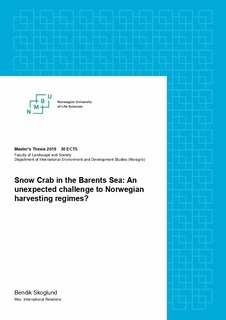| dc.contributor.advisor | Larsen, Thor | |
| dc.contributor.advisor | Østreng, Willy | |
| dc.contributor.author | Skoglund, Bendik | |
| dc.coverage.spatial | Norway, Svalbard | nb_NO |
| dc.date.accessioned | 2019-08-28T11:16:39Z | |
| dc.date.available | 2019-08-28T11:16:39Z | |
| dc.date.issued | 2019 | |
| dc.identifier.uri | http://hdl.handle.net/11250/2611398 | |
| dc.description.abstract | In January 2017, the Latvian trawler Senator was arrested by the Norwegian Coast Guard for illegal harvest of snow crabs in the Svalbard Fisheries Protection Zone (SFPZ) and was found guilty by the Norwegian Supreme Court. The trawler had a license issued by the European Union, which, in the eyes of Norwegian authorities, does not have the legitimate right to issue licenses for snow crab harvest within the zone. The actions following the verdict may have implications on Norwegian sovereignty to regulate harvest in the SFPZ and on the continental shelf, where the Norwegian government expects among half of Norwegian oil and gas resources to be located. One of the main goals in the governments Arctic strategy is to continue dialogue with the European Union on important Arctic matters and to facilitate for further petroleum industry in the Barents Sea while creating a mutual understanding of international maritime law in the Arctic. The aftermaths of the trial in the Supreme Court could prove problematic should the oil and gas explorations be successful.
The thesis uses temporal status comparison theory and the concept of identity to analyze the progression of the Norwegian Arctic Self-identity, constructed by and manifested in traditions of resource extraction, efforts in establishing and ownership over contemporary the international maritime law regime, and outside of the European Union. The thesis argues that the snow crab dispute challenges the harvesting regimes in the Barents Sea and disrupt the Norwegian Arctic Self-identity through the potential loss of sovereignty over rights to regulate the maritime resources in the SFPZ and on the continental shelf. Emphasizing the importance of a state’s Arctic Self-identity, and how it can assist in understanding the unwillingness to compromise. | nb_NO |
| dc.language.iso | eng | nb_NO |
| dc.publisher | Norwegian University of Life Sciences, Ås | nb_NO |
| dc.rights | Attribution-NonCommercial-NoDerivatives 4.0 Internasjonal | * |
| dc.rights.uri | http://creativecommons.org/licenses/by-nc-nd/4.0/deed.no | * |
| dc.subject | International Relations | nb_NO |
| dc.subject | Temporal Status Comparison Theory | nb_NO |
| dc.subject | Arctic Identity | nb_NO |
| dc.subject | Svalbard Treaty | nb_NO |
| dc.subject | Svalbard Fisheries Protection Zone | nb_NO |
| dc.subject | Arctic Fisheries Management | nb_NO |
| dc.subject | Norway | nb_NO |
| dc.subject | European Union | nb_NO |
| dc.subject | Snow Crab | nb_NO |
| dc.title | Snow crab in the Barents Sea : an unexpected challenge to Norwegian harvesting regimes? | nb_NO |
| dc.type | Master thesis | nb_NO |
| dc.subject.nsi | VDP::Social science: 200::Political science and organizational theory: 240::International politics: 243 | nb_NO |
| dc.source.pagenumber | 75 | nb_NO |
| dc.description.localcode | M-IR | nb_NO |

